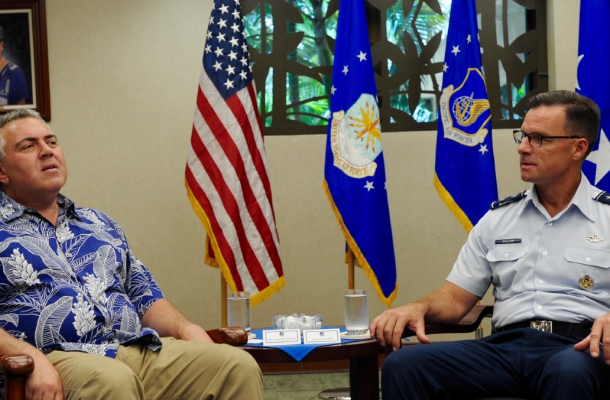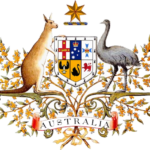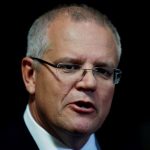Australia stands with the US (most of the time)

When Ambassador Joe Hockey returned earlier this month from the Washington posting he had held since the beginning of 2016, he pushed back against allegations that Australia is a US lapdog.
Sure, Australia has fought alongside the US in every major conflict over the past one hundred years, including disastrous forays such as the Iraq war.
But in an interview with the ABC, Hockey emphasised that during his tenure, Australia regularly disagreed with its security ally: “We disagreed with pulling out of TPP [Trans-Pacific Partnership]. We disagreed with pulling out of Paris [climate change accord]. We disagreed with them on pulling out of the JCPOA [Joint Comprehensive Plan of Action] with Iran…”
Even before 2016, Australia had been conspicuous in not always following other US requests, such as to stay out of the Beijing-headquartered Asian Infrastructure Investment Bank or to run freedom of navigations patrols within 12 nautical miles of Chinese claimed features in the South China Sea.
In other matters, like banning Chinese tech company Huawei from participating in 5G telecommunications rollouts, Canberra and Washington have taken the same action. However, it has been reported that Australia, in fact, did the leading.
So a US lapdog Australia is not.
But Hockey was also quick to add a qualification: when we disagree with the US we do so “quietly.” Hockey stated, “We’ve disagreed with the United States, but we do it in a way that doesn’t try to humiliate the United States or humiliate the President”.
Most listeners would have found the qualification unremarkable: that just sounds like sensible diplomacy. What is interesting, though, is the contrast with how Australia’s approach to managing differences with China has evolved. More than three years ago, the Australian government embarked on a distinct shift.
On 12 July 2016, a tribunal convened under the United Nations Law of the Sea (UNCLOS) had ruled against China’s actions in the South China Sea, including the building of artificial islands in the Exclusive Economic Zone of the Philippines.
Official mouthpieces of the Chinese party-state immediately denounced the decision as “ill-founded,” “naturally null and void,” and said that it would “neither acknowledge it nor accept it.”
Australia’s response was, in turn, swift and forthright. Then-Foreign Minister Julie Bishop issued a public statement on the same day that called for China to “abide by the ruling.” She went a step further, describing it as “final and binding.”
The strong words surprised many, particularly given that Australia’s interests were not under immediate or direct threat. Some Australian commentators questioned whether the government’s choice was the right one, given a huge economic reliance on China, and felt the approach was sure to cause embarrassment and raise anger in Beijing.
Canberra would also have known that it alone taking a stand would do next to nothing to deter China’s next steps. And that concerns could have been raised in other ways: the public language could have been toned down, or the forceful language kept but delivered through diplomatic channels behind closed doors. A response might have waited until other “like-minded” countries made similar announcements to provide some cover.
But Bishop explained that Australia’s longer-term interests were in an international order governed by rules rather than might, and on that point, the tribunal decision was being viewed as “an important test case.” Further, China would now understand that Australia wasn’t easily coerced.
Australia’s willingness to lead also increased the probability that a more powerful coalition of states might emerge, each with an interest in upholding the rules-based order.
Being firm has been a feature of Australia’s approach to managing China relations ever since. Whether it has been calling China out for commercial cyber theft or drawing attention to its human rights abuses, Australia hasn’t backed off.
Australia’s loudest China critics, like Peter Jennings of the Australian Strategic Policy Institute, have praised the government for having shown “growing spine,” albeit wanting even more.
In his first big foreign policy address after becoming Prime Minister, Scott Morrison declared that Australia “should not just sit back and passively await our fate in the wake of a major power contest.” A good deal of what has transpired has supported the government’s judgement. For example, fears of economic punishment have, for the most part, not materialised because China benefits from trade ties too.
But given this measure of success, what then explains the “softly, softly” approach Australia continues to take with the US? After all, these days Washington too regularly threatens Australia’s interests by eroding the rules-based order.
On December 11 last year, Australia lost the ability to seek independent adjudication in trade disputes because the US has vetoed the appointment of new judges to the World Trade Organization’s appeals body. Yet that day there was no bold public statement from Foreign Minister Marise Payne drawing attention to Australia’s concerns about US intransigence, despite it being a “test case” of obvious importance.
A cynical reading of Australia’s now divergent approaches to publicly signalling differences with the US and China is that references to the rules-based order in the case of the latter are an exercise in distraction. In reality, Australia simply wants the old power-based order in the region to continue.
Another is that the Australian government considers the threat China presents to the rules-based order under Xi Jinping a different order of magnitude to that presented by the US under Donald Trump. That’s not an unreasonable assessment, particularly given the divergence in respect the two governments show for the rule of law at home.
But if a second Trump term commences in November 2020, then surely the absolute level, and not just the relative level, of damage being inflicted will demand a firmer response.
A third possibility is a fear of retaliation. For all the talk of “100 years of mateship” and “shared values,” it is no secret that Australia’s defence and security establishment is petrified of being cut off. Hockey revealed in a separate interview that US intelligence had been “instrumental” in averting nine out of 13 plotted terrorist attacks on Australia.
There’s a clear echo here in the way that many in the business community fear being cut off by China. But a difference appears to be that the Australia government has grown in confidence that China’s self-interest means that the economic relationship is more robust to political disagreements than doomsayers alleged.
If Canberra was watching, a potentially illuminating case study unfolded last month in the security realm. Coercion doesn’t come much clearer than when US Secretary of State Mike Pompeo threatened to block intelligence sharing with the UK if it allowed Huawei into its 5G network.
The UK’s cybersecurity agencies, however, determined it was in the country’s interests to allow Huawei’s involvement and the country’s political leaders chose to call Washington’s bluff, knowing the US gained from the intelligence arrangement too.
Following the UK’s announcement that it would not close the door on Huawei, Pompeo backed off stating that the intelligence partnership “is deep, it is strong, it will remain.”
The Australian government has, of course, reached a different conclusion to the UK on Huawei. But on the general point, the case for showing “growing spine” towards the US is becoming more compelling.
This article was published by The Australian Institute for International Affairs.

Professor James Laurenceson is Deputy Director of the Australia-China Relations Institute (ACRI) at UTS. His research has been published in leading scholarly journals including China Economic Review and China Economic Journal.












